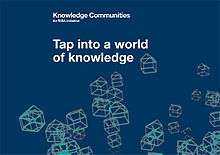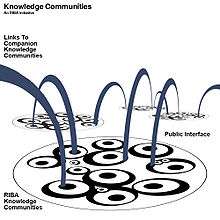RIBA Knowledge Communities

The RIBA Knowledge Communities are web supported interdisciplinary groups. They facilitate the capturing, sharing, and applying of professional knowledge relating to architecture and the built environment.
The RIBA Knowledge Communities initiative is a knowledge community platform developed by the RIBA. It is a non-commercial collaborative resource, open to all built environment professionals and anyone with interrelated knowledge to share. Its purpose is to connect and engage these professionals in the advancement of their specific subjects of interest.
People get very enthusiastic when talking about their subject and the best service the RIBA as an institution can provide is to enable that knowledge transfer through these specialist groups.[1]
Communities
There are currently RIBA Knowledge Communities for the following subject areas:
- Sustainability
For built environment professionals to discuss the sustainable production of architecture and to engage with the RIBA Sustainable Futures Group. - Integrated Project Working
To engage an interdisciplinary professional base in the advancement of CAD, BIM and the mutual distribution of technical information between all areas of the built environment. - Education Building Design
Helping to deliver intelligent higher education and further education school design and providing a forum for this discussion. - Students of Architecture
For architecture students to share news, experience and events while keeping in touch with architectural research and progression. - Regulations and Standards
To involve members in the production of building regulations and standards and to support the ongoing work of the joint BRE CIAT RIBA Technical Task Force. - Traditional Architecture
The RIBA Traditional Architecture group’s space to disseminate their research and to capture the experience of their members. - International
For the RIBA’s International department to build a knowledge bank from around the world. - Small Practice
Providing a platform for architects in small practice to share their experience while having the opportunity to be a part of the consultations for the RIBA Small Practice Group papers. - Development and Disaster Relief
To explore the difference that innovative design and construction can make in the lives of some of the most vulnerable people on earth (facilitated by Article 25). - Urban Greening
To create the pre-conditions necessary for trees to be considered as an integral part of development at the earliest conceptual and design stages of any scheme (facilitated by the Trees and Design Action Group).
Structure


The RIBA Knowledge Communities website is supported by the RIBA Research & Development department as an architectural knowledge management initiative. The communities are structured around the pre-existing RIBA committees. These groups are tasked with creating and initiating an agenda for the development of their respective subjects related to the built environment.
- Champion
An appointed RIBA Knowledge Champion acts as a focal point for the governance of their respective RIBA Knowledge Community. They are selected on the basis of their expertise and active involvement in the community’s field of knowledge. - Expert Peer Group/Committee
The Peer Group consists of approximately 5-8 individuals. They are selected for their expertise and active involvement in their community's field of knowledge. The group delegates responsibilities in liaison with the community Facilitators and community members for routine tasks and responsibilities as well as one-off activities. - Community Facilitators
Facilitators will support the creation and maintenance of the communities. They are the main administrative focus for the work of the community. They receive support from the RIBA Research & Development department and provide assistance to ‘Knowledge Champions’ and ‘Expert Peer Groups’. - Community Members
Knowledge Communities are organised as collections of architects and other professionals who are committed to collaborations within specialist areas of design, management and construction.[2]
Applications
The RIBA Knowledge Communities website provides applications designed to engage the members in their subjects of interest, these include:
- Personal blogs
- Community discussion forums
- Community events calendars
- Contacts
- Members directory
- Resources (uploading files to share with other community members)
- Tags
- RSS feeds
The RIBA Knowledge Communities is powered by Elgg (software) which is an open source networking platform. The applications are installed as plugins that can be downloaded from the Elgg community website or created by PHP developers.
References
- ↑ Spring, Martin “Interview Sunand Prasad” Building, Issue 35 (2007)
- ↑ “Article 25 join RIBA for new Knowledge Community” World Architecture News (Monday 22 March 2010)
External links
- RIBA Knowledge Communities
- RIBA Sustainable Futures Group
- BRE
- CIAT
- Architecture.com
- RIBA's International department
- RIBA Small Practice Group
- Article 25
- Trees and Design Action Group
- RIBA Research & Development department